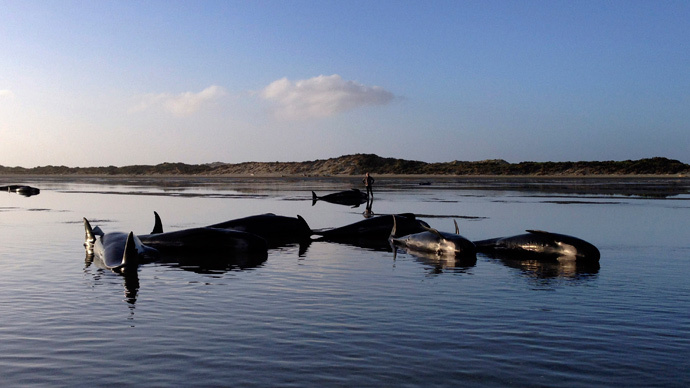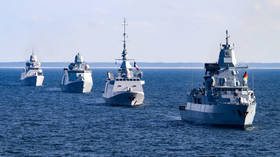Navy bomb blasts caused mass whale death – report

Scientists have concluded that four bombs detonated underwater by the Royal Navy were responsible for the death of 19 pilot whales, when they became stranded off the north of Scotland in 2011.
A report published on Wednesday by the Department for Environment, Food and Rural Affairs (DEFRA) said the noise from the explosions was likely to have interfered with the whales hearing, which caused them to drift onto the beach and die.
The report explains that four 1,000 pound bombs were exploded during the 24 hours before the mass beaching occurred, which saw 70 pilot whales swim into the shallow waters of Cape Wrath, Europe’s largest live bombing range, and become stranded by the tide.
Another 250-pound bomb was later detonated after the crisis had begun.
Locals attempted to herd the whales back into open water, but 39 became beached.
Some 20 were re-floated, but, despite efforts by experts and concerned residents, 19 of the stranded whales died, prompting a government inquiry into the disaster.
READ MORE: Penguin missing from flood-ravaged Tbilisi Zoo found hiding in debris
The report says: “The magnitude, frequency and proximity of the multiple detonations in the day prior to the stranding, and the single high-order detonation shortly after the beginning of the mass stranding, were plausible sources of significant disturbance to any neighboring marine mammals.”
The bombs were remnants of a military exercise in the area, where planes attempt to hit a small island with their explosive weaponry.
However, some of the bombs missed or failed to detonate and sank into the sea, where they were later disposed of via a controlled explosion.
The report said the three larger explosions would have had a “significant detrimental effect on the hearing and therefore navigational competence of any cetaceans in proximity.”
It further calls the Navy’s whale-spotting safety procedure “insufficient” and calls for the services to begin “burning out” bombs rather than detonating them.
READ MORE: Man saves overweight, prostrate sheep from death in Cumbria, UK (VIDEO)
“Given the potential damage to marine life from the high-order explosions of conventional disposal techniques, it is questionable why this method has not been used routinely in the past,” the report says.
A spokesperson for the Ministry of Defence (MoD) acknowledged the report raised important questions about safety procedures.
“It identified a number of possible factors that may have influenced events, one of which was the detonation of underwater explosives,” they said.
“The recommendations will be considered by the MoD and implemented where appropriate. Additional mitigation has already been put in place during munitions disposal activities conducted since 2011.”












